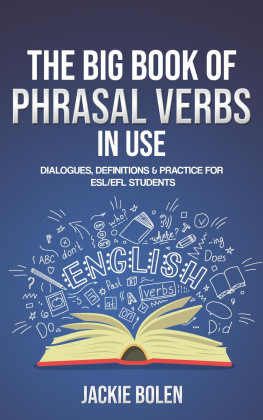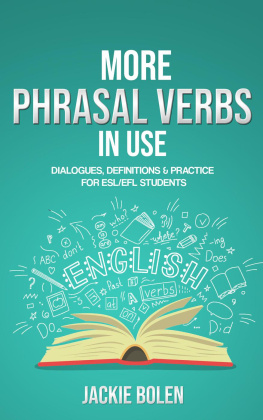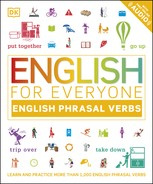Table of Contents
What are Phrasal Verbs?
Phrasal verbs are a combination of verbs and adverbs or verbs and prepositions. They are either transitive or intransitive. One of the foremost important and challenging characteristics of phrasal verbs is that the meaning of the mixture is usually quite different from the meaning of the first verb by itself.
For example :
The verb hang around , which suggests to stay somewhere for a short time without doing much, features a completely different meaning from the verb hang. Likewise, the verb pass out , which suggests nodding off or becoming unconscious, features a very different meaning from the verb pass. Finally, the verb put up with, which suggests to tolerate has little connection to the meaning of put.
The sentences below illustrate these differences.
Hang out vs. hang
- I and my friends usually hang out in this garden.
- The baby goes to hold the kitchen hanging on the wall.
Pass out vs. pass
- Stand here and do not let anyone pass out from this side.
- He was very upset as he did not pass the final exams.
Put up with vs. put
- You should stop doing this, we will not put up with bad behavior.
- Put the car within the garage.
Multiple meanings another challenging thing about phrasal verbs is that they often have quite one meaning.
Why phrasal verbs are important?
You are reading this because you want to sound like a native English speaker? Am I right?
If your answer is YES! Congratulations you have got the best e-book available in market for understanding and learning phrasal verbs.
Phrasal verbs play an important role as they're extremely common in informal English and unless you're conversant in their meanings, understanding informal language is going to be little difficult.
Hence, learning how to use phrasal verbs correctly will help you sound natural in casual English conversation and help you sound native English speaker.
Additionally, learning to use phrasal verbs correctly will assist you sound native English speaker in daily conversation.
Do not start with Grammar.
If your goal is to be really fluent in English, dont start with grammar. You must be amazed by reading this but yes thats true.
Let me explain, when you start learning a language, especially English with grammar, you are setting yourself up for failure. If you try to process all the grammar rules in your head and try to speak, you will not speak much!
English grammar has so many of inconsistencies in its rules.
Lets talk with example, the possessive of John is Johns but the possessive of It is Its not Its , which is contraction of It is . You cant simply memorize and apply all the grammar rules in English.
I would suggest a better approach is to start speaking first and then improve grammar along the way. Think about it. This is the same way you learned your first language. Isnt it?
Phrasal verbs starting with A
Sr.# | Phrasal Verb | Meaning | Sentence |
| Abide by | Accept or follow a decision or rule. | She has to abide by what her husband says. |
| Account for | To explain | I cant account for his absence. |
| Ache for | Want something | My sisters have been far away a month, I am aching for them. |
| Act on | To take action because of something like information received. | The police acted on the information received from spy on this case. |
| Acts on | Affect | Disprin only acts on infected tissue of the brain. |
| Act out | Perform something with actions | She acted out Shakespearean play in a theatre. |
| Act up | Behave badly | Amina is acting up with me. I think she might have some problems with me. |
| Act upon | To take action | You must act upon the advice of your parents |
| Add up | To make a mathematical total | The figures add up to 100. |
| Add up to | Come to a certain amount or figure | The cost of the house adds up to a million dollars. |
| Agree with | To have the same opinion | I agree with you on this matter. |
| Aim at | To target | The magazine aimed at youngsters. |
| Allow for | Include something in a plan | You should allow for a budget when planning a tour. |
| Angle for | Try to get something indirectly | He is angling for joining the party but I will not let him. |
| Answer back | To reply rudely | Her boss was shocked when she started answering him back and arguing with him. |
| Answer for | Held responsible | You would answer for any type of loss. |
| Argue down | Beat someone in a debate | The teacher tried to argue the girl down but she couldnt. |
| Argue out | Argue about a problem to find a solution | We have to argue our clashes out . |
| Ask about | Ask how someone is doing professionally or in terms of health | She asked about my mothers health. |
| Ask after | Enquire about someones health | She asked after you and I informed her about your illness. |
| Ask around | Ask several people about information | She asked around many people during her survey. |
| Ask for | Provoke a negative reaction | Salman is asking for her anger. |
| Ask for | Request to have or given | I asked him for dinner. |
| Ask in | To invite somebody into your house | I asked her in. |
| Ask over | To invite for | Salman and Rubi asked us over for drinks. |
| Ask round | Invite someone | I asked my class fellows round for group study. |
| Auction off | Sell something in auction | Mother auctioned off her jewelry to pay the fees of her daughter. |
| Abound with | To have a lot of something | The lake, we visited was abounded with fish. |
| Accede to | To permit for | Government officials acceded to review the newly imposed taxes. |
| Accustom to | To become used to | Our eyes become accustomed to darkness after some time, therefore, we can see objects in darkness. |
| Acquaint with | To make familiar with | This book is aimed at acquainting people with problems encountered during starting a business. |
| Address to | To tackle a situation | The government is not addressing the needs of the poor during a lockdown. |
Next page











